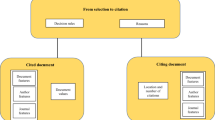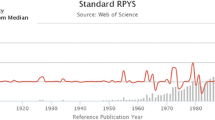Abstract
The Matthew effect is widely used by researchers across disciplines. However, few studies have focused on this effect’s magnitude variation on the background of the open access movement and expanded avenues to obtain information. Citation is the most widespread and basic form of scholarly recognition in the reward system of science, therefore, scientists are motivated to refer to the work of their peers where reference is due. This study assumes that the Matthew effect may not play a major role in science anymore and uses citations as a proxy to measure this effect, and calculates the citation fluctuation of Noble Laureates’ key publications before and after winning the award during 1901–2016. The results show that the coefficient of variation of citations is smaller for publications published after 1980 than for those published before. The median of citations in chemistry is higher than that for in physics, physiology, or medicine. Additionally, over 90% of publications published after 1980 were recognized by their community pre-award, while the ratio consisted of 84% and 75% for 1940–1980 and 1900–1940, respectively. Furthermore, the time range between publication and year awarded plays a role in this phenomenon. The study suggests a potential magnitude decrease in the Matthew effect, which is a reminder that most researchers nowadays will recognize the importance of scientific breakthrough in its early stage.






Similar content being viewed by others
References
Aljuaid, H., Iftikhar, R., Ahmad, S., Asif, M., & Tanvir Afzal, M. (2021). Important citation identification using sentiment analysis of in-text citations. Telematics and Informatics. https://doi.org/10.1016/j.tele.2020.101492
Azoulay, P., Graff-Zivin, J., Uzzi, B., Wang, D., Williams, H., Evans, J. A., . . . Guinan, E. C. (2018). Toward a more scientific science. Science, 361(6408), 1194–1197. https://doi.org/10.1126/science.aav2484
Azoulay, P., Stuart, T., & Wang, Y. (2014). Matthew: Effect or fable? Management Science, 60(1), 92–109. https://doi.org/10.1287/mnsc.2013.1755
Bao, Y., & Ma, J. (2015). Correlation between Nobel Prize and publications, citations. Libruary Theory and Practice, 8, 40–46. https://doi.org/10.14064/j.cnki.issn1005-8214.2015.08.013
Bornmann, L., & Daniel, H. D. (2008). What do citation counts measure? A review of studies on citing behavior. Journal of Documentation, 64(1), 45–80. https://doi.org/10.1108/00220410810844150
Chan, H. F., Frey, B. S., Gallus, J., & Torgler, B. (2014). Academic honors and performance. Labour Economics, 31, 188–204. https://doi.org/10.1016/j.labeco.2014.05.005
Chan, H. F., Mixon, F. G., & Torgler, B. (2017). Relation of early career performance and recognition to the probability of winning the Nobel Prize in economics. Scientometrics, 114(3), 1069–1086. https://doi.org/10.1007/s11192-017-2614-5
Cozzens, S. E. (1989). What do citations count? The rhetoric-first model. Scientometrics, 15(5–6), 437–447. https://doi.org/10.1007/bf02017064
Cronin, B. (1981). The need for a theory of citing. Journal of Documentation, 37(1), 16–24. https://doi.org/10.1108/eb026703
Erfanmanesh, M., & Moghiseh, Z. (2018). How winning an international scientific award affects publishing behavior of laureates: The case of derek de solla price medal in scientometrics. Publishing Research Quarterly, 35(2), 201–212. https://doi.org/10.1007/s12109-018-9619-7
Farys, R., & Wolbring, T. (2021). Matthew effects in science and the serial diffusion of ideas: Testing old ideas with new methods. Quantitative Science Studies, 2(2), 505–526. https://doi.org/10.1162/qss_a_00129
Franceschet, M., & Costantini, A. (2011). The first Italian research assessment exercise: A bibliometric perspective. Journal of Informetrics, 5(2), 275–291. https://doi.org/10.1016/j.joi.2010.12.002
Frandsen, T. F., & Nicolaisen, J. (2013). The ripple effect: Citation chain reactions of a Nobel Prize. Journal of the American Society for Information Science and Technology, 64(3), 437–447. https://doi.org/10.1002/asi.22785
Goodwin, J., & Garfield, E. (1980). Citation indexing-its theory and application in science, technology, and humanities. Technology and Culture. https://doi.org/10.2307/3104125
Gross, P. L., & Gross, E. M. (1927). College libraries and chemical education. Science, 66(1713), 385–389. https://doi.org/10.1126/science.66.1713.385
Guo, H., Jing, J., & He, Q. (2011). Preliminary study on the Matthew effect of citing Nobel Prize winners papers. Information Science, 29(6), 830–832.
Hou, J., Zheng, B., Zhang, Y., & Chen, C. (2021). How do Price medalists’ scholarly impact change before and after their awards? Scientometrics, 126(7), 5945–5981. https://doi.org/10.1007/s11192-021-03979-y
Hu, X., & Rousseau, R. (2016a). Nobel Prize winners 2016: Igniting or sparking foundational publications? Scientometrics, 110(2), 1053–1063. https://doi.org/10.1007/s11192-016-2205-x
Hu, X., & Rousseau, R. (2016b). Scientific influence is not always visible: The phenomenon of under-cited influential publications. Journal of Informetrics, 10(4), 1079–1091. https://doi.org/10.1016/j.joi.2016.10.002
Kong, X., Zhang, J., Zhang, D., Bu, Y., Ding, Y., & Xia, F. (2020). The gene of scientific success. ACM Transactions on Knowledge Discovery from Data, 14(4), 1–19. https://doi.org/10.1145/3385530
Li, J., Jiang, M., & Li, Y. (2014). Citation curve of Nobel Laureates. Journal of Libruary Science in China, 40(02), 41–49. https://doi.org/10.13530/j.cnki.jlis.140003
Li, J., & Shi, D. (2016). Sleeping beauties in genius work: When were they awakened? Journal of the Association for Information Science and Technology, 67(2), 432–440. https://doi.org/10.1002/asi.23380
Li, J., Yin, Y., Fortunato, S., & Wang, D. (2019). A dataset of publication records for Nobel laureates. Science Data, 6(1), 1–10. https://doi.org/10.1038/s41597-019-0033-6
Li, J., Yin, Y., Fortunato, S., & Wang, D. (2020). Scientific elite revisited: Patterns of productivity, collaboration, authorship and impact. Journal of the Royal Society, Interface, 17(165), 20200135. https://doi.org/10.1098/rsif.2020.0135
Li, X., Rousseau, R., Liang, L., Xi, F., Lü, Y., Yuan, Y., & Hu, X. (2022). Is low interdisciplinarity of references an unexpected characteristic of Nobel Prize winning research? Scientometrics, 127(4), 2105–2122. https://doi.org/10.1007/s11192-022-04290-0
Liang, G., Hou, H., Chen, Q., & Hu, Z. (2020a). Diffusion and adoption: An explanatory model of “question mark” and “rising star” articles. Scientometrics, 124(1), 219–232. https://doi.org/10.1007/s11192-020-03478-6
Liang, G., Hou, H., Ding, Y., & Hu, Z. (2020b). Knowledge recency to the birth of Nobel Prize-winning articles: Gender, career stage, and country. Journal of Informetrics, 14(3), 1–14. https://doi.org/10.1016/j.joi.2020.101053
Liang, G., Hou, H., Lou, X., & Hu, Z. (2019a). Qualifying threshold of “take-off” stage for successfully disseminated creative ideas. Scientometrics. https://doi.org/10.1007/s11192-019-03154-4
Liang, G., Hou, H., Ren, P., Bu, Y., Kong, X., & Hu, Z. (2019b). Understanding Nobel Prize-winning articles: A bibliometric analysis. Current Science, 116(3), 379–385. https://doi.org/10.18520/cs/v116/i3/379-385
Liang, G., Hou, H., Ren, P., Wang, Y., Huang, F., Wang, J., & Hu, Z. (2018). Analysis of correlation between usage count and times cited of high quality literatures. Journal of Information, 37(04), 147–153. https://doi.org/10.3969/j.issn.1002-1965
Liang, G., Lou, Y., & Hou, H. (2022). Revisiting the disruptive index: Evidence based on a long-term retrospective cohort study. Scientometrics, 127, 5721–5730. https://doi.org/10.1007/s11192-022-04499-z
McCabe, M. J., & Babutsidze, Z. (2020). Scientific prizes and post-award attention: Evidence from the Nobel Prize in economics. SSRN Electronic Journal. https://doi.org/10.2139/ssrn.3534922
McGillivray, B., & Astell, M. (2019). The relationship between usage and citations in an open access mega-journal. Scientometrics, 121(2), 817–838. https://doi.org/10.1007/s11192-019-03228-3
Medoff, M. H. (2006). Evidence of a Harvard and Chicago Matthew Effect. Journal of Economic Methodology, 13(4), 485–506. https://doi.org/10.1080/13501780601049079
Merton, R. K. (1968). The Matthew effect in science: The reward and communication systems of science are considered. Science, 159(3810), 56–63. https://doi.org/10.1126/science.159.3810.56
Min, C., Bu, Y., & Sun, J. (2021). Predicting scientific breakthroughs based on knowledge structure variations. Technological Forecasting and Social Change. https://doi.org/10.1016/j.techfore.2020.120502
Min, C., Ding, Y., Li, J., Bu, Y., Pei, L., & Sun, J. (2018). Innovation or imitation: The diffusion of citations. Journal of the Association for Information Science and Technology, 69(10), 1271–1282. https://doi.org/10.1002/asi.24047
Nigel Gilbert, G. (1977). Referencing as persuasion. Social Studies of Science, 7(1), 113–122. https://doi.org/10.1177/030631277700700112
Rocciolo, F., Gheno, A., & Brooks, C. (2022). Explaining abnormal returns in stock markets: An alpha-neutral version of the CAPM. International Review of Financial Analysis. https://doi.org/10.1016/j.irfa.2022.102143
Small, H. (2004). On the shoulders of Robert Merton: Towards a normative theory of citation. Scientometrics, 60(1), 71–79. https://doi.org/10.1023/B:SCIE.0000027310.68393.bc
Teplitskiy, M., Duede, E., Menietti, M., & Lakhani, K. R. (2022). How status of research papers affects the way they are read and cited. Research Policy. https://doi.org/10.1016/j.respol.2022.104484
Wainer, J., & Vieira, P. (2013). Correlations between bibliometrics and peer evaluation for all disciplines: The evaluation of Brazilian scientists. Scientometrics, 96(2), 395–410. https://doi.org/10.1007/s11192-013-0969-9
Wang, L., & Yue, W. (2019). Selection of Nobel Prize level scientists based on citation analysis: An overview of Clarivate Analytics citation laureates. World SCI-TECH R&d, 41(5), 447–454. https://doi.org/10.16507/j.issn.1006-6055.2019.10.007
Wang, X., Xu, S., Peng, L., Wang, Z., Wang, C., Zhang, C., & Wang, X. (2012). Exploring scientists’ working timetable: Do scientists often work overtime? Journal of Informetrics, 6(4), 655–660. https://doi.org/10.1016/j.joi.2012.07.003
Wang, Y., Jones, B. F., & Wang, D. (2019). Early-career setback and future career impact. Nature Communications, 10(1), 4331. https://doi.org/10.1038/s41467-019-12189-3
Xi, F., Rousseau, R., & Hu, X. (2021). “Sparking” and “Igniting” Key Publications of 2020 Nobel Prize Laureates. Journal of Data and Information Science, 6(2), 28–40. https://doi.org/10.2478/jdis-2021-0016
Xu, H., Winnink, J., Wu, H., Pang, H., & Wang, C. (2022). Using the catastrophe theory to discover transformative research topics. Research Evaluation, 31(1), 61–79. https://doi.org/10.1093/reseval/rvab027
Ye, F. Y., & Bornmann, L. (2017). “Smart girls” versus “sleeping beauties” in the sciences: The identification of instant and delayed recognition by using the citation angle. Journal of the Association for Information Science and Technology, 69(3), 359–367. https://doi.org/10.1002/asi.23846
Funding
This work was supported by National Natural Science Foundation of China (Project No. 72204014) and Beijing Natural Science Foundation Project (Project No.9232002).
Author information
Authors and Affiliations
Contributions
All authors contributed to the study conception and design. Material preparation, data collection and analysis were performed by GL, YL and CH. The first draft of the manuscript was written by GL, LS and all authors commented on previous versions of the manuscript. All authors read and approved the final manuscript.
Corresponding authors
Rights and permissions
Springer Nature or its licensor (e.g. a society or other partner) holds exclusive rights to this article under a publishing agreement with the author(s) or other rightsholder(s); author self-archiving of the accepted manuscript version of this article is solely governed by the terms of such publishing agreement and applicable law.
About this article
Cite this article
Liang, G., Li, Y., Song, L. et al. Magnitude decrease of the Matthew effect in citations: a study based on Nobel Prize articles. Scientometrics 128, 6357–6371 (2023). https://doi.org/10.1007/s11192-023-04874-4
Received:
Accepted:
Published:
Issue Date:
DOI: https://doi.org/10.1007/s11192-023-04874-4




